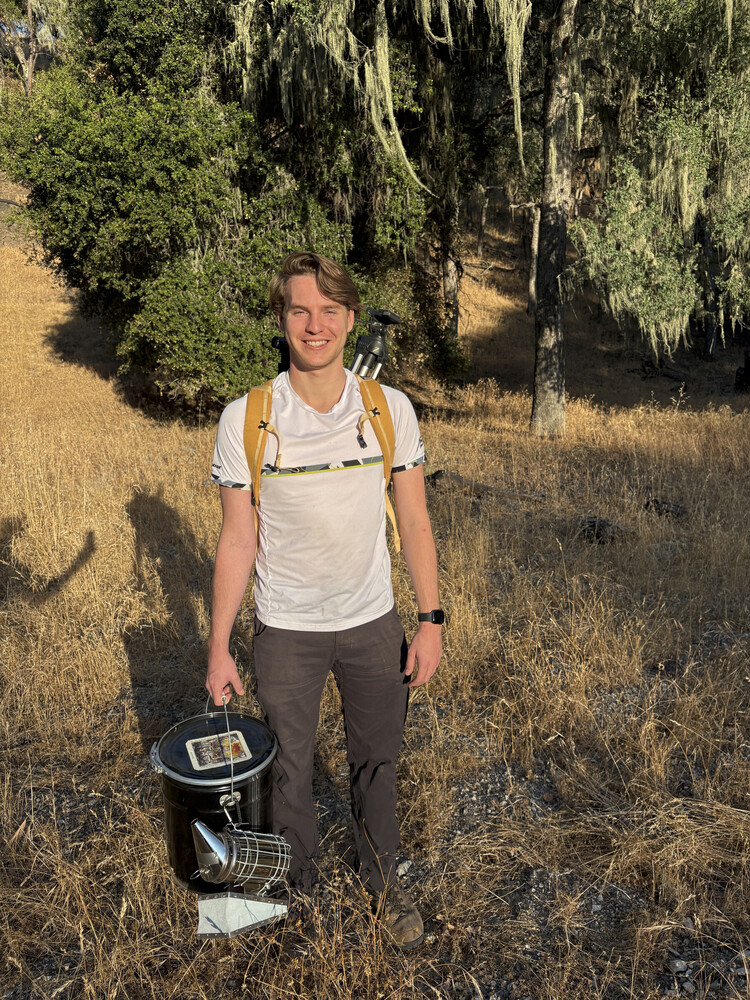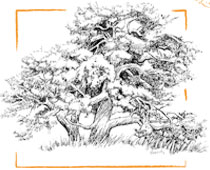By Nikki Evans and Bear Waymire

While people often wonder about the fate of wildlife in fire, they are not often considering the ants. Yet, we cannot live without ants. They are important ecosystem engineers helping to maintain healthy soil, cycle nutrients, and disperse seeds. Bear Waymire, graduate student in the Pinter-Wollman lab at the University of California-Santa Barbara, is studying the effect of fire on ant behavior and sat down to share a bit about his research with us. Read on to learn more about the effect of smoke on ants, how ant personality connects, and the mindful benefits of fieldwork!
- Tell us a little about your research at Sedgwick.
My research at Sedgwick investigates how wildfire affects ant behavior, specifically, foraging behavior and mound activity in Veromessor andrei, a native seed-harvesting ant. Colonies of this species generally contain several thousand individuals in their subterranean nest, with hundreds to thousands emerging in the mornings and evenings to maintain the nest mound and collect food through foraging trails.
To simulate wildfire conditions, I use a bee smoker to introduce smoke and measure changes in foraging and mound activity before and after exposure. Last year, an intense wildfire burned over half of Sedgwick Reserve, providing a unique opportunity to compare populations from burned and unburned habitats. By collecting data across these contrasting landscapes, I aim to determine whether behavioral traits differ within and between populations. I hypothesize that prior exposure to wildfire is associated with a heightened smoke response, either because colonies have learned to associate smoke with danger or because colonies with lower responsiveness were less likely to survive the fire. - Your research proposal discusses personality, which is not something we often associate with ants. Can you talk a little about ant personality and how you go about studying it?
Research has shown that ant colonies exhibit consistent behavioral tendencies, often referred to as ‘personality’. For example, colonies may vary in boldness, aggression, or exploratory behavior. In my research, I measure the foraging activity and mound maintenance of Veromessor andrei to determine whether these behaviors are affected by the presence of smoke. If a colony’s smoke response consistently aligns with its foraging or mound activity, it may indicate that these traits are part of a broader personality syndrome. Understanding these behavioral connections is valuable, as harvester ants influence not only their own survival but also post-wildfire ecosystem recovery through seed dispersal and soil modification.

3. Tell us a little about the lab you work within, and how your research connects.
I work at the Pinter-Wollman lab at the University of California-Los Angeles, which focuses on the behavior and ecology of social animals. My research fits into this framework by exploring how behavioral traits such as smoke response and foraging vary across colonies of Veromessor andrei and how those traits may interact.
By studying these behaviors in the context of wildfire, I’m contributing to a broader understanding of how environmental pressures shape social behavior and group-level outcomes over time.
4. What broader implications does your work have?
As wildfire frequency, intensity, and severity increase due to climate change, ecosystems are being altered in increasingly lasting and profound ways. Harvester ants act as both keystone species and ecosystem engineers, shaping their environment through behaviors such as seed dispersal and nest construction, which in turn influence processes like nutrient cycling. If behavioral traits like foraging are influenced or filtered by wildfire, the effects could extend beyond ant populations, potentially altering plant communities and the many species that depend on them.
5. What is your relationship with fieldwork like: e.g. What do you like about it? What do you find challenging?
While fieldwork naturally comes with challenges like being away from friends, family, and the comforts of home, it also offers incredible rewards. I am very fortunate to work in a place as beautiful as the Sedgwick Reserve. I may not wake up in my own bed, but I wake up to expansive, natural landscapes that are hard to find near cities or small towns. Each day, I get to work on an ecologically meaningful project that I’ve spent nearly a year developing and refining. Outside of work, being in the field encourages focus on a slower, healthier, and technologically distant life, something many (myself included) find incredibly difficult in today’s age. Overall, I am very happy with my time in the field and aim to make the most of each remaining day.
6. Do you have any advice for people hoping to launch a career in the field sciences?
There are many different outlets for getting experiences to start you off. Bird walks with the Audubon society or volunteering with local organizations and researchers are a great start. If you are affiliated with an academic institution, join a (or multiple) research labs as soon as possible. Even going camping with my friends helped me get a job backpacking through the High Sierras with the National Park Service. Field jobs often look holistically at applicants and the most passionate generally have the best resumes because they have naturally gained experiences through multiple avenues.

